2023
January
27
|
Comet C/2022 E3 (ZTF)
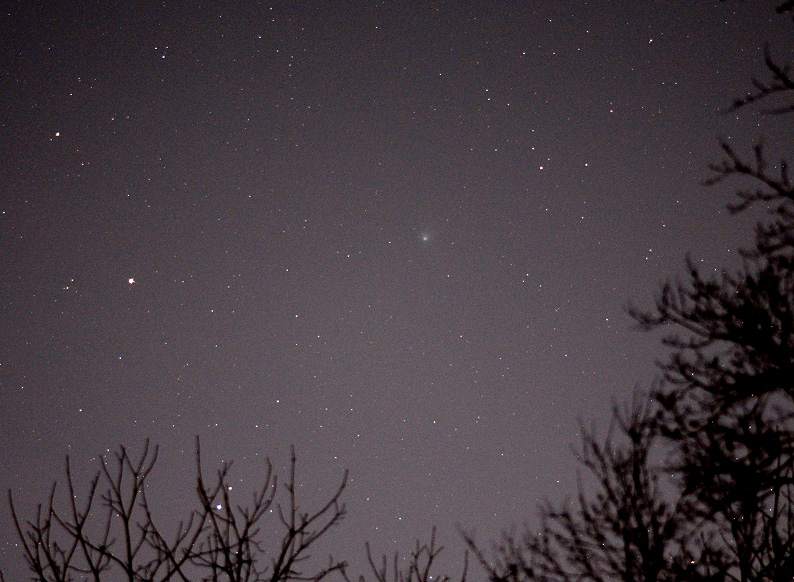
Yes, the "rare green comet seen only once every 50,000 years" is real.
This is a picture I took with simple equipment, under less-than-ideal conditions, and it
shows what the comet would have looked like with binoculars under a dark country sky.
As it happens, I was in town and could barely see the comet with 10×42 binoculars
and very trained eyes. I don't know if anyone could see it with the unaided eye.
This is a single 5-second exposure at ISO 400 with a Nikon D5300 and 105-mm lens at f/2.8,
on a fixed tripod, with long-exposure noise reduction turned on.
Some of the best smartphones can now take pictures this good.
Many of my fellow amateurs are using telescopes and long exposures to get much better pictures
of the comet. I hope to get to that myself within the next few days, but in the
meantime, this picture is a start.
Now about the "rare green comet seen only once every 50,000 years." This comet emits the same
amount of green light as many other comets.
It is
greenish around the head, yellowish in the dust tail,
and bluish in the ion tail.
I have not seen a picture of it that I would describe as
green overall.
As for 50,000 years — That doesn't mean we have to wait 50,000 years to see another comet.
There is one like this every couple of years, on average.
Most of them have extremely long orbits, and 50,000 years is a very rough estimate of how
long it will take this one to come back. Only a few comets, such as Halley's, have
orbital periods of less than a few hundred years. They have designations that start with P/
instead of C/.
News flash: The bathroom remodeling that began in October is finally officially finished!
No longer do we have to keep up with a schedule of builders coming to work on it.
Permanent link to this entry


|
2023
January
22
|
Trust the science or question the science?
I am hearing silly things said about the slogans "trust the science" and "question the science," as if they were contradictory. They're not.
When you trust the community of scientists, you are relying on an army of professional questioners. Questioning is how science proceeds. Scientists are required to be able to give the reasons for their informed opinions. Without evidence and logic, it wouldn't be science.
They do change their opinions when new information comes along. That does not mean the science was bogus in the first place. It means they had partial knowledge and are learning more.
When you decide to "question science," that doesn't mean you can just make up an alternative opinion and choose to believe it. You need to know how to do science. If you've found new evidence, it needs to be put with all the existing evidence — you don't get to throw away what's already there. And you need to know how to analyze evidence. What's your approach to statistical significance testing? Do you even realize that some effects are illusory, due to random sampling, and the probability of these illusory effects can be calculated? And of course you need to know the underlying science — if it's medicine, physiology — if it's space science, astrophysics.
The mark of cranks and conspiracy theorists is that they don't respect other people's greater knowledge. There are people who know more than I do about, for example, viruses. I am not qualified to judge every claim about such things. Instead of asking what will convince *me*, I ask whether it convinces people who really know the subject.
And to some cranks I can only say, "I don't want to know what you made up in your mind. I want to know what's true in the real world."
When this was discussed on Facebook, another very big point came up:
Scientists wait until results are replicated. Journalists report single experiments as discoveries
or breakthroughs, but scientists always ask, "Will that result hold up?"
It is surprisingly common for experiments to fail to be replicated.
People are talking about a "replication crisis" fueled partly by
widespread misunderstanding of statistical significance tests.
(Fisher said p<.05 was worth trying to replicate, not that it constituted proof.)
But here's what people don't realize.
Non-replicable results are noise, not falsehood.
They slow science down but usually do not lead it astray — not if scientists pay due
attention to replicability, which has been brought to people's attention to a great extent lately.
A single result should be viewed as a pre-test that shows you what the result might be,
not what it certainly is. What all this means is that science is hard,
not that science is bunk. I say this because I've heard the "replication crisis" used as a shallow
excuse for ignoring good medical research.
Permanent link to this entry
Down with the federal debt ceiling
The government debt ceiling does nothing to limit government debt.
It just creates drama every time it needs to be raised. The only thing to do with it is raise it or (preferably) abolish it. Spending decisions are made in the budget, not in the debt ceiling.
It is like buying a car, driving it home, and then refusing to make a payment because "it's over my limit." No. The time to think about buying the car was when you took on the payments, not when you compared them to a "limit" later.
My understanding is that we have the debt ceiling, actually, not to limit debt, but to permit it, up to a certain amount, without Congress having to specify every detail. The arbitary amount gets out of step with the actual revenue and spending.
The limit should simply be removed, so that spending decisions would themselves determine how much is spent.
Permanent link to this entry
Short notes
Cough, cough: I seem to be having my regularly scheduled late-January bout with a respiratory virus,
but it seems to be a brief one and did me the courtesy of striking on a Friday, so I haven't missed much work (yet).
Let's see how quickly the recovery goes...
Magazine retention policy: In my youth, magazines were my main source of up-to-date information
about specialized subjects (electronics, astronomy, photography, personal computers). In particular, computer
enthusiasts in the pre-Internet era relied very heavily on magazines (including PC Week, which was weekly)
to deliver the flood of information we needed to be devouring.
No more! For about 20 years, magazines have been going onto the shelf and never being taken off again.
I can actually call up most magazines digitally through the UGA Libraries or through the American Radio History
web site (for electronics).
So I've just given away hundreds of magazine issues, and my new policy is to keep only the latest 3 months, or so,
of the magazines I still get. Now I have some shelf space. More of this is coming...
La Reconquista: A lot of things in our house have been out of place since about 2012, when I hurt my ribs
(an injury that still has lingering effects) and, shortly afterward, Melody's hip problems developed.
We are doing a major cleanup, aided by two strong nephews who can carry things around much more easily
than I can. We've dubbed it La Reconquista, named after an event in Spanish history that took 700 years...
And a cleanup of this type is just like politics in one important way: You have to be willing to accept
and be thankful for partial progress.
By the way, the remodeling of our bathroom, begun in October, will be finished after just one more visit
from the painter (to touch up for a second time).
Permanent link to this entry


|
2023
January
14
|
Semicentennial year!
2023 is the 50th anniversary of probably the single most formative year of my life,
certainly the year I moved from small-town life to immersion in academia.
A lot of important things happened in 1973. Among them:
- January: I started learning computer programming, in a course at Valdosta State College
for high-school students, taught by the late great L. R. Howell.
- June-July: I attended the Georgia Governor's Honors program, majoring in physics, actually
doing computer programming, and using
my spare time to learn Italian and get familiar with Spanish literature and with medieval Latin.
- August-September: I went around the world as one of the American students sent to the
International Science School (now Messel Science School) in Sydney.
- Also August-September: My family (mother and sister) moved from Valdosta to Athens.
- September: I entered the University of Georgia, just 16 years old.
About the only major formative event that didn't happen in 1973 was meeting Melody —
that had to wait for 1975 — but 1973 was a good preparation for it.
I will probably not mark the exact anniversary dates of these things, but I will mention the
semicentennials as they come up.
Permanent link to this entry
Automated English composition is coming (if not already here)
Rather abruptly, we have entered the era in which computers can express information
by composing their own written English, like a human writer.
This is very different from just fitting names and numbers into a pre-composed document,
which of course computers have been doing since the 1950s.
Now computers can actually produce original material.
I do not think
ChatGPT is quite the finished product, though.
It produces impressive English but with two serious problems so far:
the output, though plausible, can be wildly untrue,
and the sources of information are not acknowledged.
Occasionally, ChatGPT produces a really impressive performance — not only well organized,
but accurate and insightful — and I strongly suspect that when it does that,
it is following one of its training sources
quite closely without acknowledging it.
To work well, automated English composition is going to have to work from a definite
knowledge representation, not just by transforming and paraphrasing the texts it was trained on.
But the point is, computers can now create natural-sounding, grammatical, well-organized
English text.
There has been panic. Are human writers going to be out of business?
Of course not. Did photography put artists out of business? No; photography was, from the
outset, one of the visual arts. The camera did the drawing very precisely, but the artist
still had to compose the picture and make lots of decisions about how it should look.
In the same way, writers cannot turn ChatGPT loose unsupervised.
(I predict we are about to see a lot of gibberish and howlers when they try!)
No; writing assisted by this kind of software still needs constant evaluation and
high-level decision-making by the human.
We have known all along that being a good writer is more than putting words down in a grammatical
and reasonably well-organized way. You have to be aware of what you're saying.
I predict a distinction will arise between mere imitative transformation of text
(which ChatGPT does) and text generation from reliable knowledge with a specified intent.
Some useful software is coming but isn't here yet.
And when it comes, using it will be like having a ghostwriter working with you who can
create good first drafts but does not know exactly what you want to say.
In the future, computer-composed text may not seem any creepier to us than graphs drawn
by computers, which we see all the time — and one of which is farther down in this
Notebook entry.
Permanent link to this entry
Is Comet C/2022 E3 (ZTF) a hoax?
Not quite, but the press coverage has gotten a bit out of hand.
TV stations reported that a "huge green comet would streak across the sky" a few days ago.
Actually, the best visibility of this one will be in a couple of weeks.
Currently it is visible in the early morning, in Corona Borealis.
In late January through mid-February, it is going to swing around into the evening
sky, moving from Ursa Minor through Auriga and Taurus before retreating in the direction of
Eridanus (west of Orion).
But there are two problems.
It is not very bright. It may just achieve naked-eye visibility — except for
the other problem. The moon is going to be high in the evening sky the same time the comet is.
So this is a comet I will try to photograph, but not a spectacular one.
And what about "green"? I have not seen any report that this comet is a different color than other
comets. All comets emit green light (as part of their spectrum) and show up green on digital cameras,
but not on film, nor (in my experience) do they look green to the eye.
But the press is saying this is a "rare green comet" and there's no stopping them.
Permanent link to this entry
Inflation chart
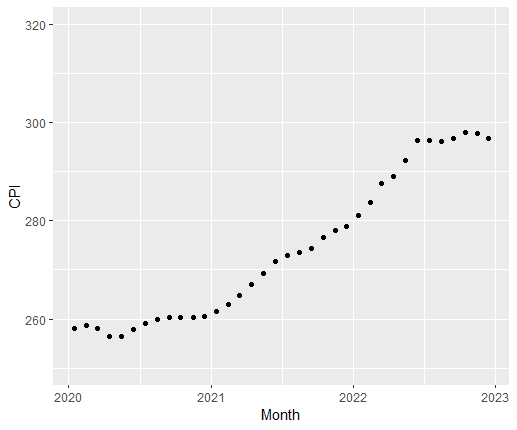
Here's this month's chart. It seems safe to say that inflation is under control;
we've had some inflation; we're not having it now, despite confusing
press coverage. (The first one who says "Prices rose 6.5% last month" is a rotten egg.
As of last month, prices are 6.5% higher than a year ago, but all of the increase was
more than six months ago.)
It's not clear what to wish for next.
The CPI figures in the graph mask the fact that the effect of inflation has been
very uneven.
Some food items are much more expensive than they used to be.
So are building materials.
Gasoline, on the other hand, is coming down.
Tesla automobiles just had a big price cut.
And so on.
Permanent link to this entry
Short notes
Today's bumper crop of Daily Notebook entries is to catch up after a hiatus;
I've been busy! Don't worry, nothing's wrong, there's just a lot going on.
I congratulate the Georgia Bulldogs on yet another national football championship.
Today a celebration is being held in Sanford Stadium and has apparently attracted as
many people as a home football game would; the stadium seats are reportedly sold out,
and the town has heavy traffic, and we're staying home.
Permanent link to this entry


|
2023
January
2
|
First astrophotography of the new year
On New Year's Day we had unseasonably warm weather (55 F at 9 p.m.) together with very high
humidity. I got my telescope out and grabbed quick images of Jupiter, Mars, and the
crater Plato on the moon. Mars was somewhat overexposed, and Mars itself is having cloudy weather,
which obscures surface features, but I am including a map of Mars seen from the same angle, to
reveal what the picture (partly) shows.
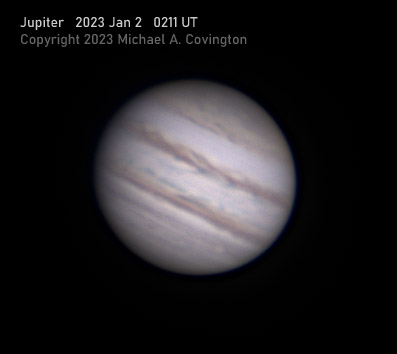
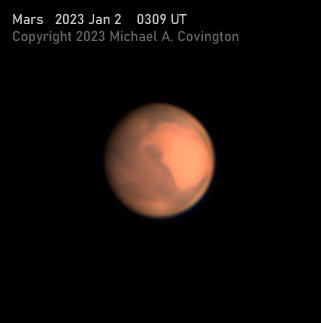
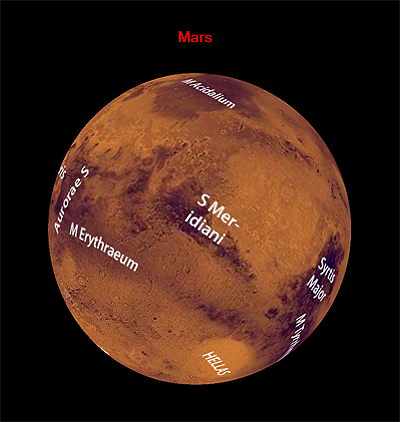
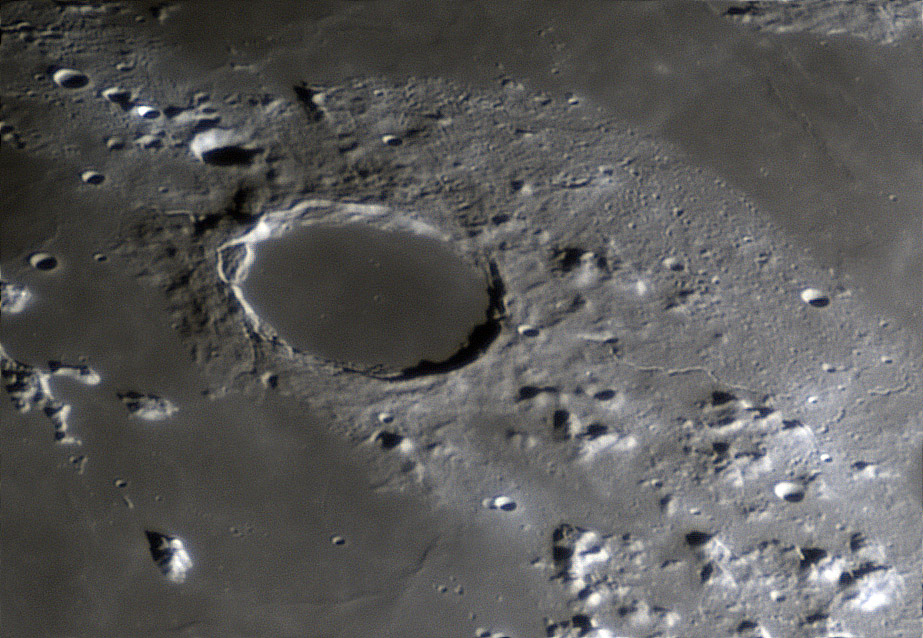
Celestron 8 EdgeHD, Losmandy GM811G, 3x extender, ASI120MC-S camera. Each image is a stack of
hundreds or thousands of video frames.
Permanent link to this entry


|
|
|
This is a private web page,
not hosted or sponsored by the University of Georgia.
Copyright 2023 Michael A. Covington.
Caching by search engines is permitted.
To go to the latest entry every day, bookmark
https://www.covingtoninnovations.com/michael/blog/Default.asp
and if you get the previous month, tell your browser to refresh.
Portrait at top of page by Sharon Covington.
This web site has never collected personal information
and is not affected by GDPR.
Google Ads may use cookies to manage the rotation of ads,
but those cookies are not made available to Covington Innovations.
No personal information is collected or stored by Covington Innovations, and never has been.
This web site is based and served entirely in the United States.
In compliance with U.S. FTC guidelines,
I am glad to point out that unless explicitly
indicated, I do not receive substantial payments, free merchandise, or other remuneration
for reviewing or mentioning products on this web site.
Any remuneration valued at more than about $10 will always be mentioned here,
and in any case my writing about products and dealers is always truthful.
Reviewed
products are usually things I purchased for my own use, or occasionally items
lent to me briefly by manufacturers and described as such.
I am no longer an Amazon Associate, and links to Amazon
no longer pay me a commission for purchases,
even if they still have my code in them.
|
|









